
-
 Swiatek sweeps into Melbourne semis, Sinner faces home test
Swiatek sweeps into Melbourne semis, Sinner faces home test
-
Rampant Swiatek sweeps into Australian Open semi-final with Keys

-
 Lanterns light up southern Chinese city ahead of Lunar New Year
Lanterns light up southern Chinese city ahead of Lunar New Year
-
'Worst ever' Man Utd turn to Europa League as saving grace

-
 Brazil saw 79% jump in area burned by fires in 2024: monitor
Brazil saw 79% jump in area burned by fires in 2024: monitor
-
Resilient Keys beats Svitolina to reach Australian Open semi-finals

-
 Most Asian markets rise after Trump AI pledge but China tariff woes return
Most Asian markets rise after Trump AI pledge but China tariff woes return
-
Djokovic mentally ready for Zverev but worried about creaking body

-
 As Trump takes aim at EVs, how far will rollback go?
As Trump takes aim at EVs, how far will rollback go?
-
No home, no insurance: The double hit from Los Angeles fires

-
 Trump targets opponents, faces criticism from catherdral pulpit
Trump targets opponents, faces criticism from catherdral pulpit
-
Ichiro becomes first Japanese player elected to MLB Hall of Fame

-
 Relentless Swiatek, dizzy Sinner eye Australian Open semi-finals
Relentless Swiatek, dizzy Sinner eye Australian Open semi-finals
-
Colombian forces edge into guerrilla strongholds

-
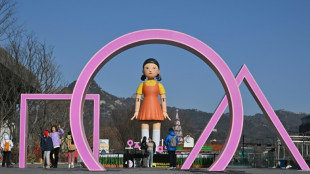 Netflix reports surge in subscribers, new price hikes
Netflix reports surge in subscribers, new price hikes
-
Panama complains to UN over Trump canal threat, starts audit

-
 Rubio, on first day, warns China with Asian partners
Rubio, on first day, warns China with Asian partners
-
Ichiro, the Japanese Hall of Famer who helped redefine baseball

-
 Ichiro becomes first Japanese elected to MLB Hall of Fame
Ichiro becomes first Japanese elected to MLB Hall of Fame
-
Rare snow socks New Orleans as Arctic blast chills much of US
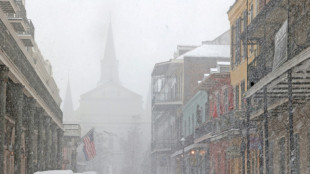
-
 Liverpool clinch Champions League last-16 berth, Barcelona win epic
Liverpool clinch Champions League last-16 berth, Barcelona win epic
-
Partner demands release of Argentine officer held for 'terrorism' in Venezuela

-
 Sad clown: 'Joker 2,' Phoenix and Gaga nominated for Razzies
Sad clown: 'Joker 2,' Phoenix and Gaga nominated for Razzies
-
Trump's birthright citizenship move challenges US identity: analysts

-
 Slot not sure if Champions League top spot 'an advantage'
Slot not sure if Champions League top spot 'an advantage'
-
Barca score wild Benfica comeback victory, reach Champions League last 16

-
 Atletico comeback win 'no coincidence', says Simeone
Atletico comeback win 'no coincidence', says Simeone
-
Mexican president urges 'cool heads' in face of Trump threats

-
 Alvarez sends Atletico past Leverkusen late as both sides see red
Alvarez sends Atletico past Leverkusen late as both sides see red
-
Liverpool's magnificent seven secures Champions League progress

-
 Barca score wild comeback victory at Benfica
Barca score wild comeback victory at Benfica
-
Rubio starts as top US diplomat meeting Asian partners

-
 Troubled Dortmund's slump continues at Bologna in Champions League
Troubled Dortmund's slump continues at Bologna in Champions League
-
Netflix surges past 300 mn subscribers
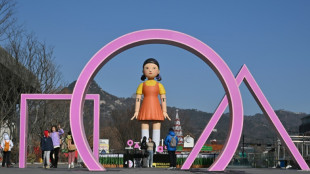
-
 Trump tests whether bulldozer can also be peacemaker
Trump tests whether bulldozer can also be peacemaker
-
Trump starts firing opponents, faces criticism in cathedral sermon

-
 Musk salute at Trump rally celebrated by extremists online
Musk salute at Trump rally celebrated by extremists online
-
Monaco down Villa to boost Champions League qualification hopes

-
 France holds off Spain as world's tourist favourite
France holds off Spain as world's tourist favourite
-
Mystery French designer Kanoush channels MMA at Paris fashion show
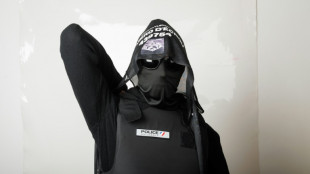
-
 Bishop lectures stony-faced Trump in church
Bishop lectures stony-faced Trump in church
-
Guardiola seeks to take pressure off Man City before PSG Champions League clash

-
 Huge fire guts Turkish ski resort hotel, killing 76
Huge fire guts Turkish ski resort hotel, killing 76
-
States sue over Trump bid to end birthright citizenship

-
 Haaland 'confident' over outcome of Man City charges after signing new deal
Haaland 'confident' over outcome of Man City charges after signing new deal
-
Trump's UN pick blasts 'anti-Semitic rot' in world body

-
 German opposition leader Merz urges united EU stance on Trump
German opposition leader Merz urges united EU stance on Trump
-
Trump pardons of Capitol rioters spark jubilation, outrage

-
 Canada vows strong response, Mexico urges calm in face of Trump threats
Canada vows strong response, Mexico urges calm in face of Trump threats
-
Trump's climate retreat will have 'significant impact' on COP30: Brazil
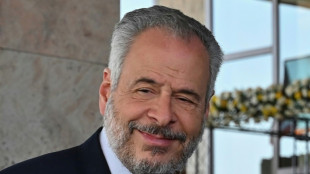

Sudanese protester killed as thousands march against coup
A Sudanese protester was shot dead Monday, medics said, during the latest march by thousands who continue to oppose a military coup which took place four months ago.
The latest death -- despite international appeals for an end to the violence -- takes the total number of people killed to at least 84 in a crackdown since General Abdel Fattah al-Burhan led an October 25 military takeover, according to independent medics.
"Tear gas canisters will not stop us!" said Taqwa Mohammed, a demonstrator near Khartoum's presidential palace, where the ruling Sovereign Council is based along the Nile River.
Around him, the bangs of stun grenades rang out, as volleys of tear gas canisters fell into the crowds, hissing out acrid clouds of red, green or yellow smoke.
"Down with Burhan!" the crowd chanted.
Some protesters hurled rocks at the soldiers, while others kicked back or picked up the hissing tear gas canisters.
Thousands also demonstrated in other cities.
"We are ready to die for our cause," said Anouar Bashir, another protester in Khartoum.
"The world must see the violence of the putschists."
The protester killed Monday was shot in the head in Khartoum's twin city of Omdurman, according to the Sudanese Doctors' Committee. The shooting happened as thousands of demonstrators tried to cross the bridge across the Nile linking the city to Khartoum.
- 'Power to the people' -
More than 2,000 protesters have been injured since October, medics say, while the UN has said at least 13 protesters were raped.
Last week, United Nations rights expert Adama Dieng, during a mission to Sudan, expressed concern "about the violations (committed by) the authorities and the use of live ammunition against protesters."
Both the UN and the United States have made similar appeals before, with Washington threatening further "consequences" if violence continues. The coup, Sudan's latest, has already led to suspension of international aid.
Sudanese authorities have said they arrested several police and soldiers who fired at demonstrators with Kalashnikov rifles, disobeying orders.
Earlier this month, Human Rights Watch quoted witnesses detailing how the security forces have used both "live ammunition" and fired tear gas canisters "directly" at crowds, a tactic that can be deadly at close quarters.
The coup derailed a fragile power-sharing arrangement between the army and civilians negotiated after the 2019 ouster of longtime autocrat Omar al-Bashir.
In Wad Madani, about 200 kilometres (125 miles) south of Khartoum, around 4,000 demonstrators took to the streets on Monday.
"Power to the people", they chanted, witnesses said. "Soldiers, go back to the barracks!"
In the eastern city of Gedaref, around 2,000 people rallied against the military, after calls to protest were made by the "resistance committees", neighbourhood groups of activists organising opposition to coup.
While people took to the streets, the UN mission in Khartoum released a report following five weeks of meetings with military chiefs, political leaders and civil society representatives, an initiative it hopes will "address the current political impasse and develop a path towards democracy and peace".
The UN mission said it "remains committed to supporting a civilian-led democratic government as the ultimate objective of the transitional period in Sudan," a statement said.
Anti-coup protesters who regularly take to the streets -- sometimes in the tens of thousands -- reject partnership with the military.
Ch.Campbell--AT
